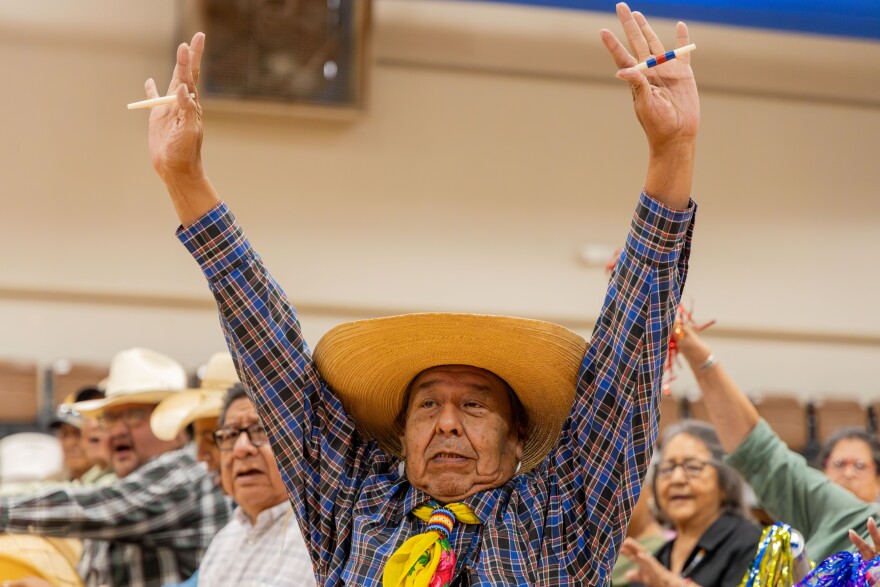As a little girl in the early 1970s, Lee Colorado, who is Apache, learned how to play Handgame in her great-grandmother’s shed in the wintertime.
She explained that the history of the game existed as far back as she could remember.
Now, Colorado is 61 and is still using her Handgame knowledge—most recently, in a Kiowa vs. Apache Handgame competition among seniors.
“It's a friendly competition,” Colorado said. “We could see each other outside and go, ‘Oh, you guys beat us,’ or you'll get the ripping after. But it's always nice, and it warms my heart.”

The event was the first of its kind, organized by the Administration of Aging, also known as AOA, of the Kiowa and Apache nations.
Janelle Horse, Support Services Coordinator at the Kiowa AOA, helped organize the event to help Kiowa adults 55 years of age and older overcome isolation.
“We try to plan activities that will get them out of the home and come and enjoy the event because a lot of them are at home,” Horse said. “Some of them live by themselves.”
In 2021, the National Resource Center on Native American Aging released a survey collected from 2017 to 2020, showing about one-third of Indigenous seniors do not participate in cultural practices. That includes traditional food, music and customs.
Fifteen percent of those surveyed reported not socializing at all.
But Horse is trying her best to change that.
“We provide bus passes to our elders so they can have freedom to go wherever they want and not to have to ask family members to take them here and there,” Horse said.
Horse explained the bus transit drives them to doctor’s appointments, the grocery store or other essential activities.
Other times, AOA workers may pick them up and bring them to events like the Handgame competition, which drew quite a crowd.

About 120 participants signed up to enter the gift drawings donated by the Apache Tribe of Oklahoma, and many of them participated in Handgame.
“It was a good turnout,” Colorado said. “Because when you see our AOAs, they're like not that many people are going to be there. But combine them, we have a lot of people.”
Handgame, not to be confused with lacrosse, is sometimes called ‘Stickgame’ because of the counting sticks used to keep points.
As Phil "Joe Fish" Dupoint, the Kiowa Cultural Preservationist Director, explained, Handgame involves two teams that take turns guessing and hiding two pairs of bones.

“It’s button, button, who has got the button?” Dupoint said. “If you're able to hide, OK. If you're able to guess, OK.”
Within the pair of bones, one bone is unmarked and one is marked. Whoever is given the bones hides them, while someone from the other team must guess which bones are marked. During the game, songs are sung to distract players.
Dupoint said the history of Handgame stretches back to around the time when the Kiowas became close with the Crows.
“We were nomadic people at one time, and we came from up to the British Columbia area,” Dupoint said. “And we befriended the Crows. They shared their hunting grounds with us.”
He said since then, multiple visitations have occurred and relationships have strengthened. In fact, he is planning for a crowd of Crow citizens to return this winter November to play Handgame.
“So they would come down in November, and then we go up there in May,” he said.
However, Handgame is not just played by Crows and Kiowas and Apaches. It’s played by a handful of tribes now located in Oklahoma and in the northwest. And the way the game is played may vary from tribe to tribe.
“There's nothing more livelier than our style, the way we play,” Dupoint said. “I mean, everybody's just hollering and jumping around.”

One thing that’s great about all that hollering and jumping around is how older people have their kids and grandkids with them, he said.
“Us older generation. We got to carry it on, but we got a lot of young people that are participating,” Dupoint said. “And so with that, well, then I know this culture is going to go on.”
More than 50 years have passed since Lee Colorado learned Handgame. Now, it’s her turn to pass this knowledge on to her grandchildren.
She says her granddaughter is young and is still learning the game. But hopefully the little girl can pass it down to future generations 50 years from now, too.
“She doesn't really know the gist just yet, ” Colorado said. “But she'll get it.”
This report was produced by the Oklahoma Public Media Exchange, a collaboration of public media organizations. Help support collaborative journalism by donating at the link at the top of this webpage.










